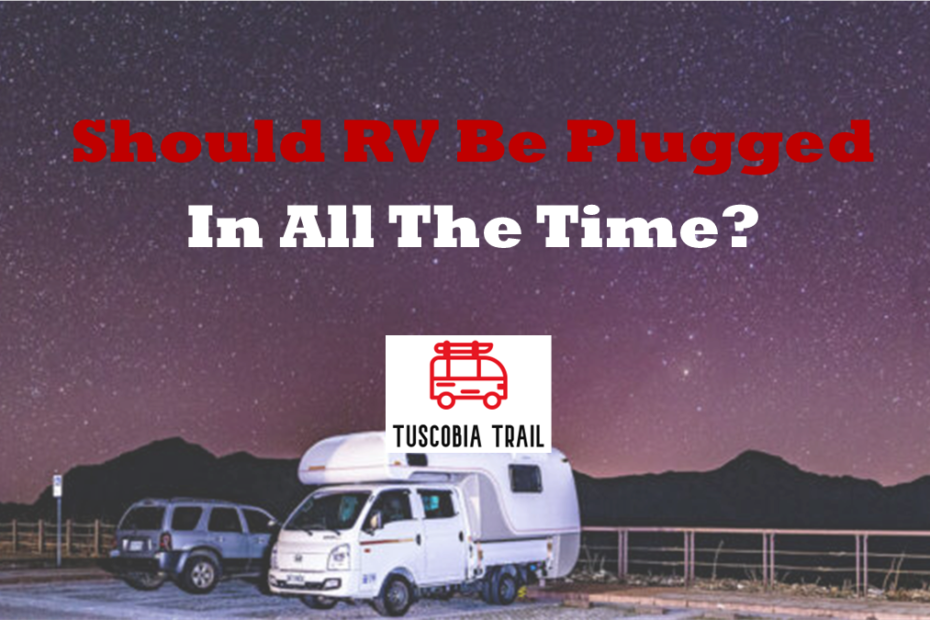Deciding whether to keep your RV plugged in continuously is a common dilemma for RV owners, especially during off-seasons. Here’s our take on should an RV be plugged in all the time?
While there are benefits to keeping your RV connected to shore power, there are also potential drawbacks to consider too that could cost you over time.
As van owners, we know the pros and cons to this scenario have lived through it. Do you leave your solar panels to generate electricity or keep the mains plugged in?
Advantages Of Keeping Your RV Plugged In
The main advantage of leaving your RV plugged in is maintaining climate control, including preventing pipes from freezing in cold weather and keep the interior comfortable.
It also ensures your batteries stay charged and your RV is ready for spontaneous trips whenever you need to use it to go on the road.
For newer RVs with smart converters, leaving the RV plugged in is generally safe. These converters can detect when batteries are fully charged and switch to a trickle charge mode to prevent overcharging.
If you decide to keep your RV plugged in, it’s important to use a surge protector to safeguard against electrical issues.
Regularly check battery fluid levels and overall condition and ensure proper ventilation to prevent moisture buildup inside your RV during winter particularly.
Remember though to periodically run and maintain appliances to keep them in good working order regardless of how frequently you use your RV.
Negatives Of Plugging In An RV All The Time
Owners of older RVs without this technology should be cautious about leaving their RV plugged in for extended periods.
Increased energy costs from running appliances and climate control systems continuously is one of the downsides to consider.
Potential wear and tear on RV systems and appliances that aren’t designed for constant use should also be considering.
You can also risk battery damage in older RVs without smart charging systems by leaving it plugged in, while exposure to power surges or electrical anomalies could damage RV components.
Leaving an RV plugged in all the time can potentially damage the batteries and lead to overcharging, which depletes the batteries’ electrolyte levels.
Reduced battery lifespan is also common, as is sulfation buildup if batteries are not fully charged for long periods.
Best Practices For Winterizing An RV
The level of winterization needed for your RV may vary depending on how extreme the winter conditions are and whether you’re actively use or instead opt to store your RV.
Some best practices for winterizing an RV to avoid freezing issues include installing RV skirting. It is considered one of the most effective methods to protect your RV from freezing temperatures.
Skirting creates a barrier around the base of the RV, trapping heat and preventing cold air from reaching the underside.
Insulate windows and doors by using heavy fabric curtains, bubble wrap, or foam boards to add extra insulation and prevent cold air from seeping in.
Protect pipes and water supply with pipe insulation and heat tape on exposed pipes, add RV antifreeze to gray and black tanks and consider using heated water hoses for your water supply.
FAQs
Do RV batteries charge when plugged into shore power?
Yes, RV batteries typically charge when plugged into shore power, provided the battery disconnect switch is in the correct position and there’s sufficient power available.
How much electricity does an RV use when plugged in?
On average, an RV uses about 20 kWh per day when plugged in, which translates to approximately 608 kWh per month.
Is it safe to leave my RV refrigerator running all the time?
While it’s generally safe, most RV refrigerators need to be periodically cycled off and thawed to prevent damage to the cooling coils. You can, of course, use your RV fridge while driving.
Should I disconnect my RV battery when plugged in?
For most modern RV electrical systems with smart charging systems, it’s not necessary to disconnect the battery when plugged in.
However, using the battery disconnect switch is recommended during maintenance, storage without shore power, or when using a tow vehicle’s 7-pin receptacle.
Can leaving my RV plugged in damage the batteries?
In newer RVs with smart chargers, leaving the RV plugged in shouldn’t damage the batteries. However, in older RVs without this technology, there’s a risk of overcharging and damaging the batteries.
